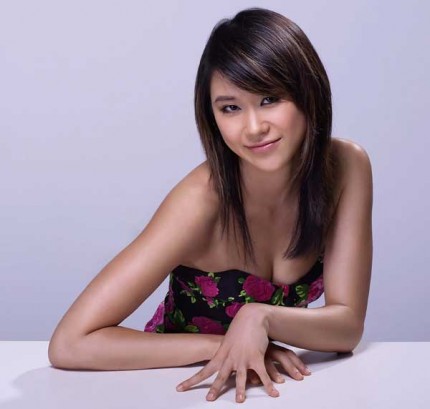Yuja Wang shows flame-throwing virtuosity as well as artistic maturity

In just a few short years, Yuja Wang has quickly become one of the hottest young classical artists around, blessed with a marketing-friendly image and a powerhouse technique that allows the young pianist to seemingly do anything at the keyboard.
Wang made her Chicago recital debut in 2006 as a last-minute substitute for Murray Perahia, appearing with conductor Charles Dutoit and the Chicago Symphony Orchestra in her CSO subscription bow the following year.
The Chinese pianist, 24, returned to Chicago for a recital Sunday afternoon at Symphony Center, which demonstrated that Wang is undeniably one of the most complete and technically equipped of today’s young generation of keyboard firebrands.
Yet, in addition to delivering some of the most jaw-dropping piano playing heard all season, Wang also showed she has grown into a deeper artist beyond the flash, tackling a demanding recital with a distinctive mix of poetry, power and interpretive maturity.
Though now regarded as one of his late masterpieces, Rachmaninoff had ambivalent feeling about his Corelli Variations, the composer-pianist often skipping several sections in performance when he felt the audience was growing bored.
Wang however is clearly a true believer in this intensely difficult music. Her statement of Corelli’s opening theme was played with tender simplicity and the twenty ensuing variations were fully and vividly characterized with notable delicacy in the lyric sections and staggering speed and bravura in the complex variations.
Schubert’s Sonata in C minor, D.958 was more impressive still. Here Wang showed herself a graceful and insightful Schubertian, bringing out all the elements of this challenging music while keeping a keen sense of architecture and the work’s ultimate destination. The opening Beethoven-like echoes were forcefully played yet with a quicksilver ebb and flow, and fine detailing as with the eerie bass tremolos near the coda.
The Adagio was particularly inspired with Wang fluently segueing from poised lyricism into the darker regions with idiomatic grace and a free rubato. The brief minuet had the requisite vernal freshness and the finale for once felt like a true conclusion with Wang’s feather-like articulation and light touch in the galumphing main theme bringing out the off-kilter playfulness.
Scriabin is favored repertoire for Wang and her five mostly early selections showed an innate sympathy for the Russian’s blend of languid sensuality and explosive virtuosity.
In Scriabin’s Prelude in B major, Op. 11, no. 11, Wang brought out the Chopinesque charm starkly contrasted with the frantic bravura of the ensuing Prelude in B minor (Op. 13, no. 6). She also surely conveyed the melancholy introspection of the Prelude in G-sharp minor (Op. 11, no 12) and the rhapsodic virtuosity of the Etude in G-sharp minor. In the more mature Scriabin of the Poem in F-sharp major (Op. 32, no. 1) Wang explored this introspective music with playing of gossamer tenderness and a striking range of subtle hues and half-tones.
If the first half of Sunday’s program showed Wang’s increased artistic maturity, the second revealed her as a remarkable throwback to the old school of virtuoso keyboard spellbinders.
With no announcement she jettisoned the slated Night on Bald Mountain for Horowitz’s dazzling Carmen Fantasy, throwing off the ludicrous complexities with astonishing speed and faultless technique. Taken at a fleet clip Rachmaninoff’s arrangement of Mendelssohn’s Midsummer Night’s Dream Scherzo was just as extraordinary.
If anyone doubted that Wang is one of the most supremely gifted keyboard technicians of our day, her closer of Liszt’s transcription of Saint-Saens’ Danse macabre should allay any doubts. Performed in Horowitz’s version, with even more insane complexities piled on top of Liszt’s, Wang’s flame-throwing romp blazed through all the challenges with a power, velocity and infallible technique that seemed almost inhuman.
The loud cheers and ovations brought Wang back for three encores: an atmospheric rendition of the Liszt transcription of Schubert’s Gretchen am Spinnrade; Anatoly Volodos’s fiendishly brilliant take on Mozart’s Ronda alla Turca; and a wistful, meditative closer of the Gluck/Sgambati Dance of the Blessed Spirits.
Posted in Performances





Posted Apr 07, 2011 at 10:52 am by terry deal baer
i attended. for two hundred years the modern piano-forte has been waiting for someone…young yuja is that someone.
Posted Apr 29, 2011 at 4:01 pm by terry baer
also…young yuja creates a sound that has never been heard before.